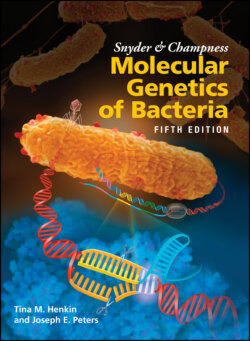Читать книгу Snyder and Champness Molecular Genetics of Bacteria - Tina M. Henkin - Страница 35
Inheritance in Bacteria
ОглавлениеIn the early part of the 1900s, biologists agreed that inheritance in higher organisms follows Darwinian principles. According to Charles Darwin, changes in the hereditary properties of organisms occur randomly and are passed on to the progeny. In general, the changes that happen to be beneficial to the organism are more apt to be passed on to subsequent generations.
With the discovery of the molecular basis for heredity, Darwinian evolution now has a strong theoretical foundation. The properties of organisms are determined by the sequence of their DNA, and as the organisms multiply, changes in this sequence sometimes occur randomly and without regard to the organism’s environment. However, if a random change in the DNA happens to be beneficial in the situation in which the organism finds itself, the organism has an improved chance of surviving and reproducing.
As late as the 1940s, many bacteriologists thought that inheritance in bacteria was different from inheritance in other organisms. It was thought that rather than enduring random changes, bacteria could adapt to their environment by some sort of “directed” change and that the adapted organisms could then somehow pass on the change to their offspring. Such opinions were encouraged by the observations of bacteria growing under selective conditions. For example, in the presence of an antibiotic, all the bacteria in the culture soon become resistant to the antibiotic. It seemed as though the resistant bacterial mutants appeared in response to the antibiotic.
One of the first convincing demonstrations that inheritance in bacteria follows Darwinian principles was made in 1943 by Salvador Luria and Max Delbrück (see chapter 3 and Suggested Reading). Their work demonstrated that particular phenotypes, in their case resistance to a virus, occur randomly in a growlng population, even in the absence of the virus. By the directed-change or adaptive-mutation hypothesis, the resistant mutants should have appeared only in the presence of the virus.
The demonstration that inheritance in bacteria follows the same principles as inheritance in eukaryotic organisms set the stage for the use of bacteria in studies of basic genetic principles common to all organisms.
